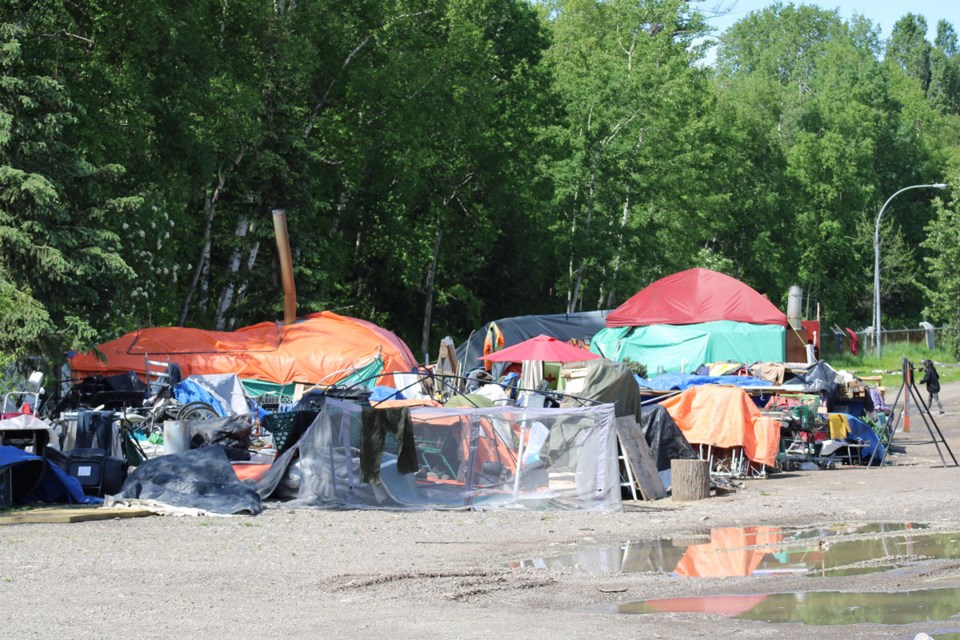The City of Prince George will look to request formal meetings with a range of provincial ministries and agencies to address “the crisis our community is facing” in terms of homelessness, mental health and addictions."
City council approved an amended version of a notice of motion brought forward by Coun. Kyle Sampson to request a meeting with representatives of Northern Health, BC Housing and the ministries of health, mental health and addictions, social development, municipal affairs and poverty reduction and the attorney general and minister responsible for housing – or whatever those ministries are called, after Premier David Eby’s new cabinet is sworn in on Wednesday.
“I want to add that the intent of behind this motion isn’t adversarial,” Sampson said. “We have needs and issues within our community… We can’t expect them to know what we need if we don’t tell them.”
Council was divided on how quickly to move on the proposed meeting. Sampson said the city is facing a crisis, and should request the meetings as quickly as possible after the new ministers are sworn in.
In November, Eby announced plans to introduce legislation that would allow the province to set housing targets for municipalities. Prince George could potentially be a pilot project for how that legislation rolls out, Sampson said.
“I think every municipality is trying to figure out how we’re going to handle this legislation,” he said. “If we can shape what this looks like in the north, we could have a leadership role in this new government.”
Coun. Cori Ramsay said municipalities across the province are facing similar challenges.
“Now that we are done the election, a lot of municipalities will be looking for these meetings. We’re still likely to wait several months for these meetings,” she said. “I don’t think there is any harm in passing this tonight to get the ball rolling.”
Coun. Garth Frizzell proposed moving the matter over to the city’s Standing Committee on Intergovernmental Affairs to refine and develop the plan, before reaching out to set up the meetings.
“I don’t think the provincial government is going to skip over Prince George,” Frizzell said. “(But) I do think (the Standing Committee on Intergovernmental Affairs) needs to meet, and meet quickly, on how we are going to chase this. We do want to get moving quickly, but not too quickly.”
During the meeting, Mayor Simon Yu suggested that the Ministry of Municipal Affairs should be included in the invitation.
“We’ve already identified another ministry,” Frizzell said. “Maybe there is additional ones right away.”
Preparing a workshop format for that many different ministries is “a massive ask,” Coun. Brian Skakun said, and “could be a full-time job for a months” for city staff.
Skakun said in his view, it’s one thing to put the requests out quickly, but “as for the rest of the strategy, it has got to be done right.”
“What are our expectations, and what are the low-hanging fruit?”
Coun. Ron Polillo and Tim Bennett both said they believed there is no reason that council can't send out the invitations, while also referring the issue to the committee. Ultimately, Sampson amended his motion to include a referral to the Standing Committee on Intergovernmental Affairs as well.
Council approved the amended motion.
"I think we can walk, talk and chew gum at the same time," Sampson said.
‘A GROWING CONCERN’
In the notice of motion, Sampson said the goal is for the provincial agencies “to inform Council, City staff, and the public of what steps and initiatives the Provincial Government is and will be taking to address the crisis our community is facing with respect to homelessness and the encampments, as well as with our severe addictions and mental health crisis; and for the City to further emphasize the increasing challenges our community is experiencing.”
While Prince George has become the social service hub of northern B.C., the city doesn’t have the same level of provincial services seen in other municipalities in the Lower Mainland and Southern Interior, Samson wrote.
“The impacts of homelessness, the encampments, as well as the mental health and addictions epidemic are a growing concern and are impacting all residents of our community, including those living directly with these struggles,” Sampson wrote. “Although areas like health, housing, mental health, and addictions are not under the jurisdiction of a local government, this is our community, and we need to take the next steps beyond simple advocacy and gain the supports necessary to resolve these issues.”
Sampson said he would also like the meeting to discuss the issue of prolific offenders, and how the province can help support the city’s policing efforts to address them.
“It is imperative that we continue to do our part as a municipality and provide the necessary police resources, however, we need more answers from the provincial government on their plans to help address these limited individuals who are causing the majority of crime throughout our city,” he wrote.



